Dr. Daniel Hook
1795 - 1870
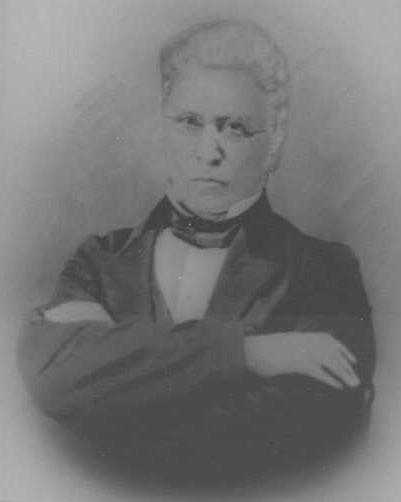
Biographical Sketch On The Life Of Dr. Daniel Hook
Dr. Daniel Hook was largely responsible for organizing the Atlanta, Augusta, Griffin, Acworth, Sandersville, and other congregations in Georgia in the mid-1800s. He was the first state evangelist among churches of Christ in the state. He was one of the first persons to proclaim the Restoration plea in the Deep South. His frank, cordial manner and commanding appearance made him an attractive person.
The youngest of four children, he was born Apr. 6, 1795, at Point of Rocks, Frederick County, Md., the son of John and Sarah (Burgess) Hook. He was christened an Episcopalian. While an infant, his mother died. His father married again and moved to Kentucky. Daniel and his sister, Mary D., were adopted by a wealthy bachelor uncle, James S. Hook. The boy's childhood was spent at the uncle's Potomac Hills estate, Daniel's birthplace.
After attending school near home, Daniel enrolled at Carlyle College in Pennsylvania. His uncle urged him to take up law, but the young man preferred medical study. He was graduated from the University of Maryland School of Medicine at Baltimore with the M.D. degree in 1820. He had received a B.M. degree in 1819. The uncle lost his slaves and land, making Daniel dependent upon his own resources.
Twenty-two and single, Dr. Hook began practicing medicine at Louisville, former state capitol in Jefferson County, Ga., in 1817. Medical licensure was not strict then. In the spring of 1818, he was married to Miss Catherine Schley. She was the daughter of John Jacob Schley and the sister of William Schley, Georgia Congressman, elected twice, and eighteenth Governor of Georgia (1835-37), and several other distinguished brothers. The couple lived together more than 50 years before death separated them. They had two sons and four daughters; one, Mary, became, in 1853, the wife of Judge Clark Howell. A son, James Schley Hook, became a judge and married the sister of T. M. Harris, preacher for years in Georgia churches.
In 1823, at the age of 28 he traveled to Augusta for confirmation as an Episcopalian. He became a devoted student of the Bible. Five years later, 1828, through the kindness of a neighbor, he was introduced to the writings of Alexander Campbell. (Campbell still a Baptist preacher until 1830.) Consequently, he soon sought immersion from a Baptist preacher. After many objections, the Rev. Jonathan Huff (1789-1872) baptized him in Brushy Creek near Ways Meetinghouse. The ordinance was performed without the relation of a prior religious experience ordinarily required by Baptists. Dr. Hook's wife objected to his becoming a Baptist, and she remained a strict Presbyterian until 1842.
He attended the services of the Ozzias Baptist Church near Louisville. That congregation even licensed him to preach. There he often read the Scripture, commented upon it, and offered prayer. That is, he did until the pastor, the Rev. J.H.T. Kilpatrick (1793-1869), became disturbed at the effects upon other members of the parish. Then, in a sermon, the pastor denounced Dr. Hook for being a wolf in sheep's clothing. Thus, the little church was closed to Dr. Hook's teaching and he was isolated from that fellowship.
Dr. Hook moved to Augusta in 1832. He built his home, Richmond Hill, six miles south of the town. Shortly afterwards he rejoiced upon learning that Captain Edward Campfield, a Baptist, was attracted by the plea for New Testament Christianity. The Campfields had been expelled from the Baptist church in Savannah after their involvement with the church of Christ in that city. In 1835 the Campfields, along with Dr. Hook, worked together to organize the church after the ancient order. They met on a regular basis in their homes for prayer, reading of the Bible, singing, and the observance of the Lord's Supper. Soon Dr. Hook began preaching on a regular basis. They were joined in 1836 by Mrs. Emily Tubman, (1794-1885), who later was known as the great benefactress of the church, both in Georgia, South Carolina, and in Kentucky.
In 1834 or 1835, every member of the Hook family was stricken with scarlet fever. The two youngest children, Emily and America, died. The home was sold eventually to Dr. Hook's brother-in-law, Judge John Schley, and the Hook family established residence at Augusta. When William Schley was elected Governor of Georgia in November, 1835, Dr. Hook became president of the Richmond Factory, for cotton and woolen manufacture, which the two owned.
In the summer of 1839 a yellow fever epidemic scourged Augusta. Dr. Hook discovered it and remained in town with the stricken. After successfully treating more than 200 patients, and losing only two, he became ill. When he found the fever coming on himself, he sat down on the steps he was ascending to see a patient, and wrote out his own treatment, and directed his driver when he returned to his carriage, to give it to Dr. Johnson (who had adopted his treatment) and tell him to pursue it strictly. He was ill for several weeks, but finally recovered.
As a result of his sacrificial service, the citizens of Augusta expressed their gratitude by electing Dr. Hook mayor, first in 1840 for a one-year term, and then re-electing him in 1842. His name was first proposed for the honor by a local newspaperman.
He received additional recognition, too. He was elected a trustee of the University of Georgia by the State Legislature. He was a member of the first Board of Trustees of the Atlanta Medical College and served on the 1853 Board of Health there. He was the first physician in the state to use quinine in medical practice. As a Mason, he was the first grand secretary in Georgia of the Masonic Grand Lodge and had an address on Masonry printed and circulated widely by that fraternity.
Those things, however, did not cause him to neglect his religious interests and his fervent desire for the union of all Christians on the basis of the New Testament. Seldom did anything interfere with Dr. Hook's preaching. His daughter narrated one time when something did, however, in the following words, "Such was his zeal that he could preach to a few with as much fervor as though the house had been filled with an enthusiastic audience. One night just for a little pleasantry, the seven persons who composed the congregation, seated themselves in seven pews in front of the other in a straight row. Dr. Hook saw a straight streak of faces looking at him merrily, and while his face shown for one moment with an amused expression, he at once proceeded with his duties and with all the solemnity and order of the occasion."
After Alexander Campbell's popular visit to Augusta in the spring of 1845, the orthodox residents of Augusta concocted a scheme to discredit Dr. Hook and the congregation of Christians. Even a professional boycott was resorted to, apparently, for, financially embarrassed, Dr. Hook, 50 years old, moved from Augusta.
The Augusta brethren aided him in the crisis. They sent him out as a general evangelist in May, 1845, supporting his family. In March, 1849, he organized the Griffin church with seven members. He was welcomed in both Georgia and South Carolina, but the small compensation temporarily crushed him.
He moved back to Jefferson County in August, 1847, and resumed medical practice with his son, Dr. Edward D. Hook. He preached whenever doors were opened to him, which was seldom. Meanwhile, he continued working with the Augusta church as best he could, attended services there "pretty regularly in winter, and by consent, irregularly in summer." Samuel J. Pinkerton of Kentucky became the Augusta preacher in 1847 after Dr. Hook's departure.
In 1849 Dr. Hook's Georgia brethren really honored him. He was their representative at the first national convention of the brotherhood at Cincinnati, Ohio, in October. There he was elected vice-president of the assembly and helped to organize the American Christian Missionary Society that had elected Alexander Campbell as its first president. The spirit of cooperation was lifting the spirits of the brethren from Georgia to Ohio and beyond.
In 1849 Dr. Hook was unanimously elected as the first Georgia state evangelist. In August, 1851, he moved to Atlanta and soon established a congregation. He helped to organize other churches as well. He, along with Nathan W. Smith, established the work at Berea of Henry County which sent more youth into the ministry than any other church in Georgia.
About 1857 he had a debate with a Methodist minister in Sandersville. Dr. Hook answered the pamphlet attacking him, called Campbellism Exposed, with another entitled, A Tract in Reply to An Attack of Rev. Mr. Mysic.
Dr. Hook's last days were "financially easy." His biographer stated: "He was in very comfortable circumstances in life. His home, bought in Atlanta, on Decatur Street, proved a good investment, and other sales of property, both in Atlanta and Alabama, had realized fair profits on the cost, and his services as minister were highly appreciated, and paid for accordingly, so that his last days are best in every way-financially easy-and his whole heart and life consecrated to the work of God."
His death occurred on July 27, 1870, at the home of his daughter, Mrs. Mary Howell, near Atlanta. He was 75 years old. "He did not die rich, but he died with all the honors that became a man and a Christian.
Webmaster's Note: Much of this biographical sketch comes from the book, Disciples of Christ in Georgia, by J. Edward Moseley. Some has been edited with information being added from other sources. Moseley footnoted in his discussion that most of his information came from an unpublished manuscript of the daughter of Dr. Hook, Mrs. Mary D. Howell, a copy of which is on file at the Disciples Of Christ Historical Society.
![]()
ELDER DANIEL HOOK, M. D.
It is with mingled joy and grief that I record the death of this eminent and good man. When I think of his sufferings here and of his sweet rest there, I rejoice for the change; but when I reflect upon the loss sustained by his family, his friends and especially his brethren, sorrow fills my heart.
Dr. Hook was the oldest and most prominent preacher of the Christian Church in Georgia. He was identified with the cause of primitive Christianity, in the days of the early struggles for its restoration - in the times which tried men's souls. Few of this generation can appreciate the strength of faith, the accuracy of knowledge, and the heroism of soul, which were necessary to our fathers in breasting the current of opposition which they encountered. Times have changed. We have grown numerically strong, the opposition has become intrinsically feeble. Here and there an adventurous or wily foe may attempt to sap or undermine our stronghold of Scripture and logic, but the numbers who have the temerity to assail it directly are daily becoming fewer. And even these make their assaults with fear and trembling. They have but little heart for the task. They do not themselves believe in the charges that they make.
But it was not ever thus. Dr. Hook and his contemporaries met and repelled earnest men; men who verily thought within themselves that they ought to do many things against us; that our position was groundless, and our doctrine pernicious; and that they were serving God and humanity in pulling us down. They failed, signally failed. Nay, many of them are now, like Paul, preaching the faith which once they destroyed. But honor, all honor to the men who stood firm amid the storm. And of these, the subject of this notice deserves a prominent place.
Dr. Daniel Hook was born in the State of Maryland, April 6, 1795. He was trained in the school of Episcopalianism. He came to Georgia a young man, and settled in Jefferson County, where he remained for several years in the successful practice of his profession. While there he providentially got hold of some of the the writings of Alexander Campbell which directed his mind into such a course of study and reflection as influenced his whole subsequent life. An intelligent Baptist minister by the name of Huff consented to baptize him upon a simple profession of his faith in the Christ, and the Baptist church of which Mr. Huff was pastor received him into its communion without other condition or stipulation. It even licensed him to preach, with the distinct understanding that he would have nothing to do with human creeds or confessions of faith. After laboring in this field for a considerable time, and so leavening the churches with the simple Gospel as to excite the opposition of some of he watchful conservators of usage and orthodoxy, he removed in 1832 to Richmond County, near the city of Augusta, and subsequently into the city itself.
Twice has this city been visited with the scourge of Yellow Fever. The first time was in 1839. Dr. Hook was living at the time in the country, but upon the breaking out of the fever he came, at the risk of his life into town, to give his professional services to the afflicted. The eminence of his skill in the treatment of this disease is almost without a parallel. Out of 200 cases treated by him, he lost but two. Unhappily, he was himself attacked with the fell disease before his work was finished, but by the mercy of God the same treatment which had proved so successful in the case of others was equally efficacious in his own. He was spared.
Settling permanently in the city, he was elected to its chief magistracy for two years, and with other honors and emoluments, his life, secularly speaking, was already successful. But there was a higher life to live, a better success to gain.
He and Bro. and Sister Campfield who still are spared to us, excluded from the Baptist Church for communing with a little band of Disciples in Savannah "as pure and good as ever lived"organized as a church, meeting and breaking bread in private houses, and preaching the Word to all, both in public and in private, as they had opportunity. Such was the origin of the Christian Church in Augusta.
It came up out of great tribulation. Its infancy was consecrated by prayers and tears and sufferings. Its young life was directed by faithfulness to God, and by self-denial and self sacrifice for His sake. Its first pastor has been surpassed by none of his successors in the breadth and depth of his knowledge of God's word, in the fidelity and accuracy of his teachings or in the beauty and consistency of his exemplary life.
In 1852 he removed to Atlanta and devoted many years to the work of an evangelist,traveling over every part of Georgia and portions of South Carolina, preaching the word. He was a good preacher. In his prime and under favorable circumstances few could surpass him. He wrote also a good deal and wrote well. Much of the success of the Christian Union, published in this city in 1856 was due to his facile and able pen, and especially to his counsel and direction as senior editor.
The labors of his active and useful life closed several years ago. God had enabled him to illustrate the character of a faithful Christian worker. It remained only to crown his honors by permitting him, also, to illustrate the sweetness and gentleness of a patient Christian sufferer. In all these years of agonizing pain, his example has taught to those about him, what his lips had often so eloquently preached, the supporting power and consolation of the Gospel. At last, on the 27th of July, 1870, his Father said "It is enough. Come up higher. Enter thou into the joys of thy Lord."
He fell asleep at the house of his daughter, Mrs. Col. Howell, near Atlanta, with his children and most of his grandchildren around him. After such words of comfort and improvement, as I was able to speak, from the dying retrospect and prospect of Paul, "I have fought a good fight; I have finished my course, I have kept the faith; henceforth there is laid up for me a crown of righteousness which the Lord, the righteous judge will give me in that day," we laid his remains away in a quiet and beautiful grove, far from the noise and strife of the busy world, asleep in Jesus, blessed sleep.
Bro. Hook leaves a wife, three children and numerous grandchildren to mourn his loss. But they sorrow not as those who have no hope; and they are able to acquiesce with Christian cheerfulness in the will of their Saviour.
-JJames S. Lamar, Reporting In The Christian Standard, Cincinnati, August 27, 1870
![]()
Biography On The Life Of Dr. Daniel Hook
Catherine Schley Hook, the wife of Dr. Hook was the sister of Governor of Georgia and U.S. Congressman William Schley Of Augusta, GA
Another Site On William Schley
![]()
Burial Place Of Dr. Daniel Hook
GPS Location Of Grave
33°48'40.8"N 84°24'45.3"W
or D.d. 33.811333, -84.412583
I began searching for the final resting place of Dr. Daniel Hook in 1999. In the Franklin Garrett Necrology Database, a database on computer in the Georgia State Archive Building, downtown Atlanta, File #0264. I found the listing for the Howell-Hook Family Cemetery located off Howell Mill Rd. just north of downtown Atlanta. The record was made May 16, 1931, (61 years after Hook's death). According to the recorder, the location of the grave is on the east side of McKinley Road, N.W. about one block from Howell Mill Road. Land Lot #153, 17th District, Fulton County, Cook's District. Taking I-75 north of downtown Atlanta, go to the second exit after I-75/I-85 connector, the Howell Mill Rd. Exit and turn right. Go about 1/4 mile and turn right on McKinley Rd. Immediately straight ahead is the location of the final resting place of Hook. The recorder explained: "No visible trace remains of this old cemetery. The graves were never permanently marked and the temporary markers have long since disappeared. The site of the cemetery was shown to the Compiler, on the above date by Miss Kate Lyon, of Howell Mill Road, a granddaughter of the original Clark Howell. The site of the cemetery is a small elevation, covered by a growth, not dense, of small trees and bushes. According to Miss Lyon, the following persons are buried there: Dr. Daniel Hook; Catharine Schley Hook, wife of Dr. Daniel Hook, Died about 1876; Infants: Clark Lyon and Effie Lyon; James Howell, infant son of Mr. & Mrs. Clark Howell, Jr.; An Unknown Baby. Note: The original Clark Howell (1811-1882) was married three times; the third wife being Mary D. Hook, daughter of Dr. & Mrs. Daniel Hook." This cemetery is located on the land that was owned by Clark and Mary Howell. Both Clark and Mary were faithful members of the Christian Church/churches of Christ. They are buried in the Oakland Cemetery, SE of downtown Atlanta on Memorial Drive. See their graves below.
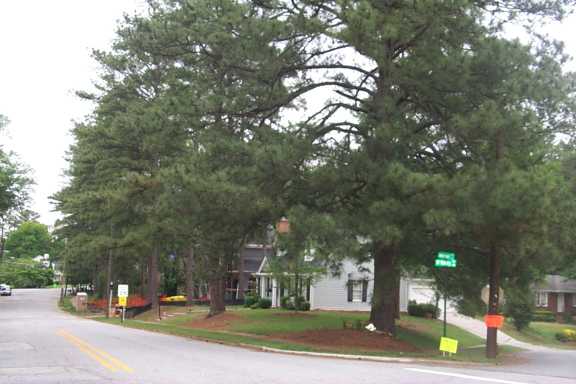
Present East Side Of McKinley Rd. N.W. Lot #153 -
The site of the burial place of
Dr. Daniel Hook - Homes Are Now Present On The Site Of The Old Cemetery.
![]()
Clark Howell & Mary Hook Howell
daughter of Dr. Daniel & Catherine Hook
Buried In Oakland Cemetery, SE Atlanta
on Memorial Drive near downtown. To find the graves, it will be necessary
to visit the cemetery office and ask for a map. Also buried at the
cemetery is a preacher of yesteryear, Alvinzi G.
Thomas. And, unrelated to the restoration movement, another person of
renown who is buried at Oakland is Margaret Mitchell, the authoress of
Gone With The Wind.
GPS Location Of The Graves Of The Howells
33°44'50.1"N 84°22'09.0"W
or D.d. 33.747250, -84.369167
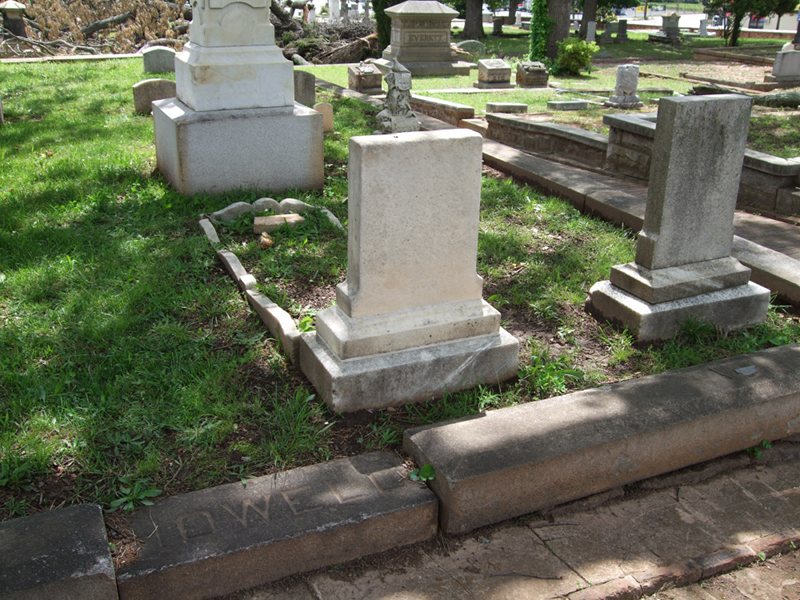
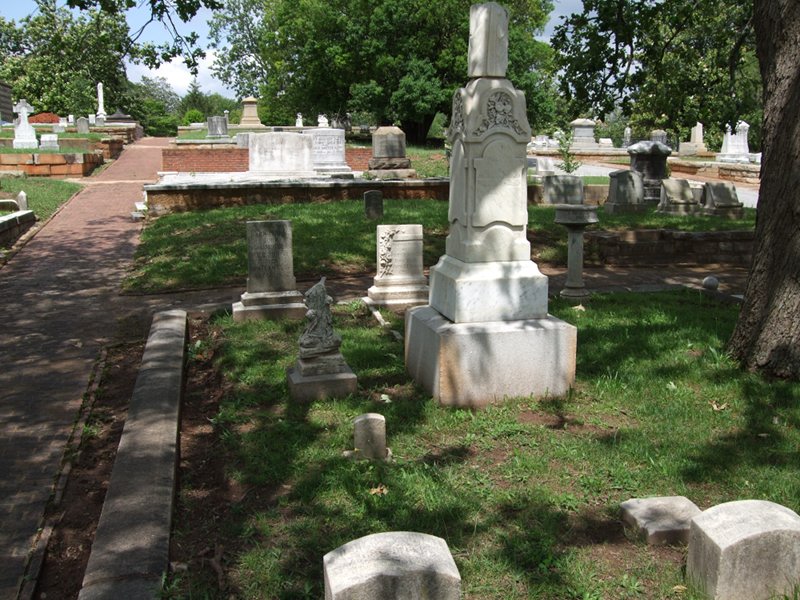

In Loving Memory
Of
Mary D. Howell
Died 186
Aged 57 Years
Asleep In Jesus
May We Meet Again. - Kittie.
(Daughter of Daniel Hook)
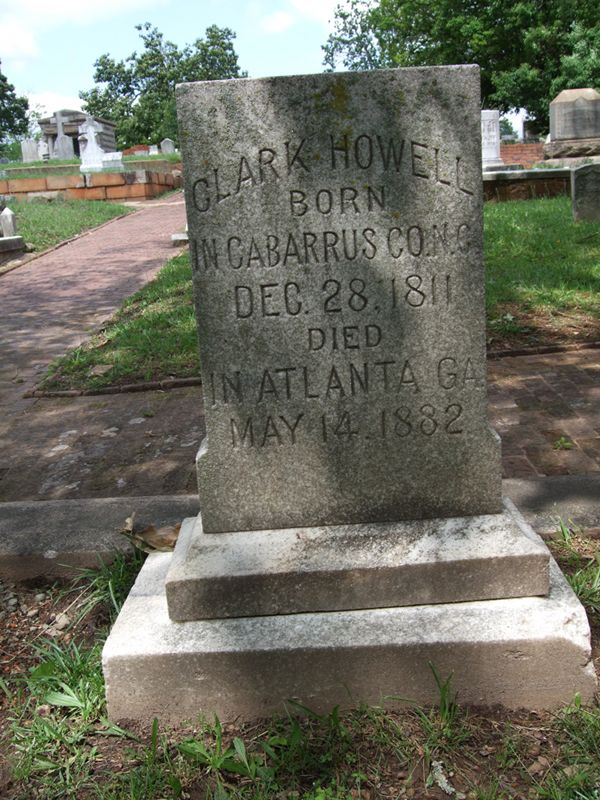
Clark Howell
BORN
In Cabarrus Co. NC
Dec. 28, 1811
DIED
In Atlanta, GA.
May 14, 1882
(Son-In-Law of Daniel & Catherine Schley Hook)
![]()